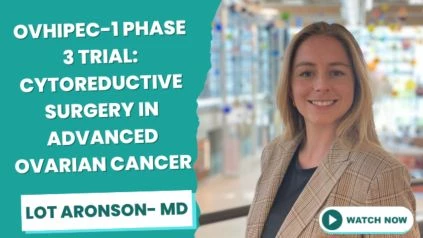By. Allen Wilbanks
Date. 11/23/2023
Lot Aronson, MD, a medical doctor and researcher from the Department of Gynecologic Oncology in the Netherlands Cancer Institute, engaged in a discussion with Allen Wilbanks of Oncology Tube. The focus was the updated 10-year survival analysis from the OVHIPEC-1 trial, exploring the effects of cytoreductive surgery with or without hypothermic intraperitoneal chemotherapy (HIPEC) in patients with advanced ovarian cancer.
Aronson initiated the conversation by providing an overview of the trial’s design, emphasizing its initiation in 2006 and subsequent publication in 2018. The OVHIPEC-1 trial, an open-label, randomized controlled phase three study, recruited patients from specialized centers in the Netherlands and Belgium. The inclusion criteria were stringent, targeting patients with extensive ovarian cancer who were considered feasible for the trial if primary complete site reduction was deemed unattainable. The primary endpoint was progression-free survival, with overall survival as a secondary measure.
The initial results, shared in 2018 with a median follow-up of 4.7 years, demonstrated an improvement in progression-free and overall survival with the addition of OVHIPEC-1. The latest update, with a median follow-up of 10.1 years, affirmed these findings. Aronson highlighted the extension of recurrence-free periods by 3.5 months and an overall survival improvement of approximately 12 months, exhibiting a plateau after five to seven years.
Moreover, Aronson addressed the implications of the trial’s findings on the treatment paradigm for stage 3 ovarian cancer patients, particularly those with extensive disease. She expressed optimism that the long-term survival benefits, now supported by data, would encourage broader adoption of OVHIPEC-1 in clinical practice globally, ultimately enhancing survival rates for women with ovarian cancer.
The discussion took an insightful turn when Allen Wilbanks inquired about exploratory post hoc analyses regarding BRCA1/2 mutational status and homologous recombination deficiency (HRD) profile. Aronson revealed results indicating that patients without a BRCA mutation but with an HRD phenotype seemed to derive the most benefit from OVHIPEC-1. This outcome raised hypotheses about the interplay between HRD and hyperthermia in compromising DNA repair mechanisms, potentially sensitizing tumors to chemotherapy.
Further, the conversation touched upon ongoing trials, notably the GOG 3068 study exploring the combination of cisplatin-based OVHIPEC-1 with maintenance therapy using PARP inhibitors. Aronson elaborated on the potential synergy between OVHIPEC-1 and PARP inhibitors, emphasizing the sensitization of BRCA wild-type tumors to PARP inhibitors induced by hyperthermia. She detailed the design of GOG 3068, a phase three randomized controlled trial, and expressed anticipation for results, emphasizing the need for further evaluation before influencing treatment decisions based on these findings.
In the concluding segment, the discussion extended to the broader landscape of ovarian cancer treatment. Aronson highlighted ongoing trials exploring the combination of OVHIPEC-1 with immunotherapy and adjuvant intraperitoneal chemotherapy. She emphasized the need for continued research to uncover synergies between these emerging treatments and OVHIPEC-1, striving to further improve survival outcomes for ovarian cancer patients.
Overall, Lot Aronson, MD, provided a comprehensive overview of the OVHIPEC-1 trial, its implications for ovarian cancer treatment, and the potential directions for future research.

